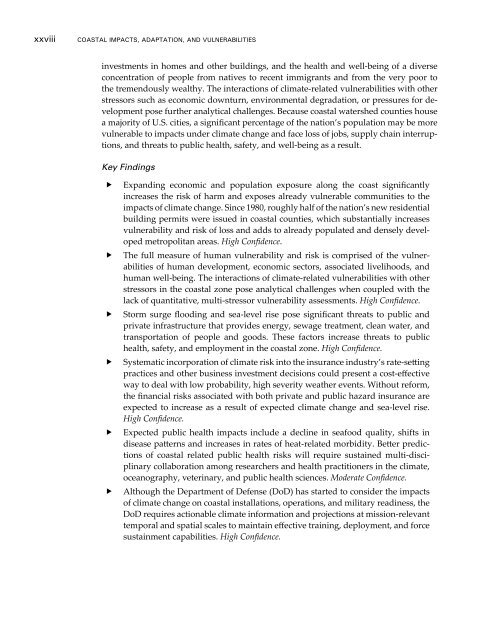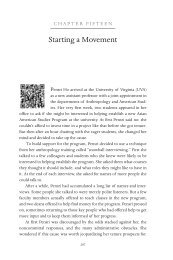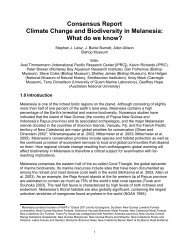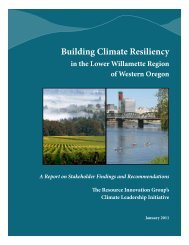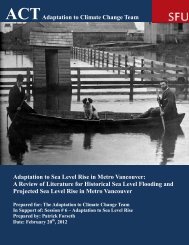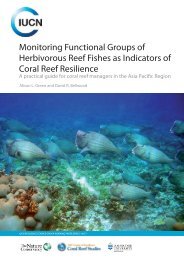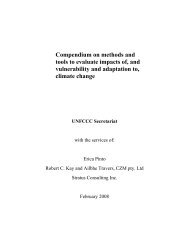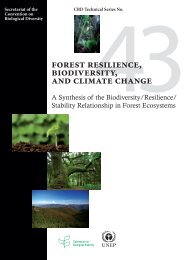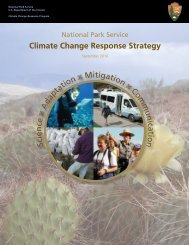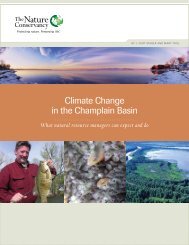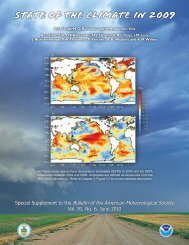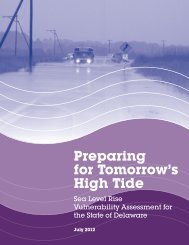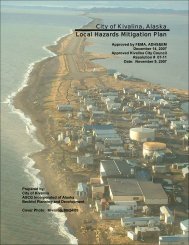Coastal Impacts, Adaptation, and Vulnerabilities - Climate ...
Coastal Impacts, Adaptation, and Vulnerabilities - Climate ...
Coastal Impacts, Adaptation, and Vulnerabilities - Climate ...
Create successful ePaper yourself
Turn your PDF publications into a flip-book with our unique Google optimized e-Paper software.
xxviii<strong>Coastal</strong> <strong>Impacts</strong>, <strong>Adaptation</strong>, <strong>and</strong> <strong>Vulnerabilities</strong>investments in homes <strong>and</strong> other buildings, <strong>and</strong> the health <strong>and</strong> well-being of a diverseconcentration of people from natives to recent immigrants <strong>and</strong> from the very poor tothe tremendously wealthy. The interactions of climate-related vulnerabilities with otherstressors such as economic downturn, environmental degradation, or pressures for developmentpose further analytical challenges. Because coastal watershed counties housea majority of U.S. cities, a significant percentage of the nation’s population may be morevulnerable to impacts under climate change <strong>and</strong> face loss of jobs, supply chain interruptions,<strong>and</strong> threats to public health, safety, <strong>and</strong> well-being as a result.Key FindingsffffffffffffExp<strong>and</strong>ing economic <strong>and</strong> population exposure along the coast significantlyincreases the risk of harm <strong>and</strong> exposes already vulnerable communities to theimpacts of climate change. Since 1980, roughly half of the nation’s new residentialbuilding permits were issued in coastal counties, which substantially increasesvulnerability <strong>and</strong> risk of loss <strong>and</strong> adds to already populated <strong>and</strong> densely developedmetropolitan areas. High Confidence.The full measure of human vulnerability <strong>and</strong> risk is comprised of the vulnerabilitiesof human development, economic sectors, associated livelihoods, <strong>and</strong>human well-being. The interactions of climate-related vulnerabilities with otherstressors in the coastal zone pose analytical challenges when coupled with thelack of quantitative, multi-stressor vulnerability assessments. High Confidence.Storm surge flooding <strong>and</strong> sea-level rise pose significant threats to public <strong>and</strong>private infrastructure that provides energy, sewage treatment, clean water, <strong>and</strong>transportation of people <strong>and</strong> goods. These factors increase threats to publichealth, safety, <strong>and</strong> employment in the coastal zone. High Confidence.Systematic incorporation of climate risk into the insurance industry’s rate-settingpractices <strong>and</strong> other business investment decisions could present a cost-effectiveway to deal with low probability, high severity weather events. Without reform,the financial risks associated with both private <strong>and</strong> public hazard insurance areexpected to increase as a result of expected climate change <strong>and</strong> sea-level rise.High Confidence.Expected public health impacts include a decline in seafood quality, shifts indisease patterns <strong>and</strong> increases in rates of heat-related morbidity. Better predictionsof coastal related public health risks will require sustained multi-disciplinarycollaboration among researchers <strong>and</strong> health practitioners in the climate,oceanography, veterinary, <strong>and</strong> public health sciences. Moderate Confidence.Although the Department of Defense (DoD) has started to consider the impactsof climate change on coastal installations, operations, <strong>and</strong> military readiness, theDoD requires actionable climate information <strong>and</strong> projections at mission-relevanttemporal <strong>and</strong> spatial scales to maintain effective training, deployment, <strong>and</strong> forcesustainment capabilities. High Confidence.


